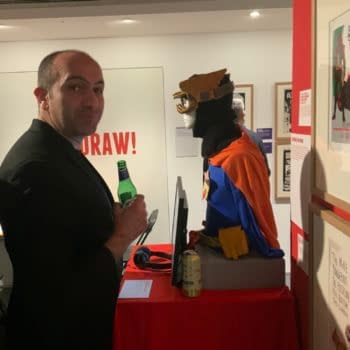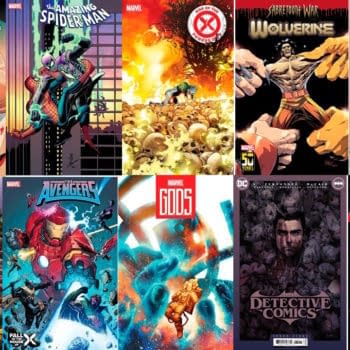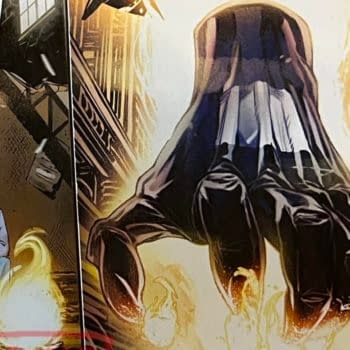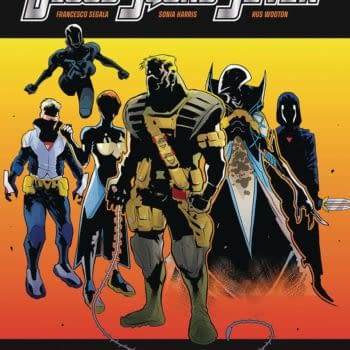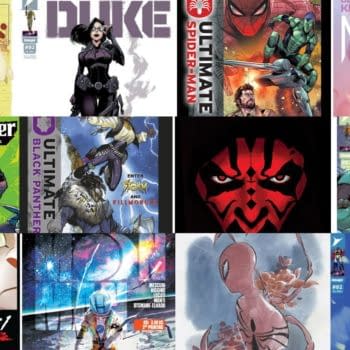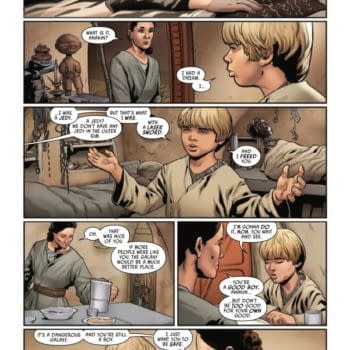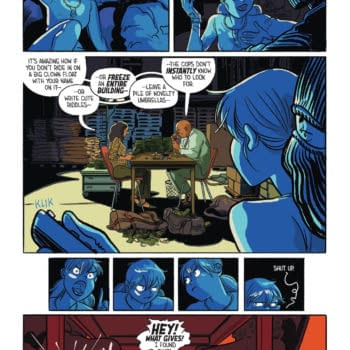Posted in: Comics, Current News | Tagged: coliseum of comics, comic shop, florida
Comic Book Store Owners Say The Funniest Things Part One
Earlier this month, Phil Boyle, owner of the Floridian chain of comic book stores, Coliseum Of Comics, diagnosed the comic industry ails.
Article Summary
- Phil Boyle criticizes Marvel/DC for retailer hardships and comic pricing issues.
- Comic industry debates role of variant covers and their impact on sales.
- Retailer suggests radical pricing model to sustain comic book stores.
- Industry veterans and retailers discuss the changing landscape of comic sales.
Earlier this month, Phil Boyle, owner of the Floridian chain of comic book stores, Coliseum Of Comics, and number 56 on the Bleeding Cool Top 100 Power List, wrote an article for ICV2 that proved incendiary.
Phil Boyle of Coliseum of Comics in 2023
Challenging Marvel and DC Comics, he said "you've gutted an army of passionate retailers who've worked in this biz for decades for close to poverty wages in many cases. To put such a system of advocates in every state and major city in America, and around much of the world, would cost a fortune. But it happened organically to your benefit, and in gratitude, you've strip-mined what little profit there was in favor of short-term goals and chasing corporate bonuses."
He saw the causes as pretty clear. "The immediate sale and false bolstering of numbers through variant covers, convoluted events, and incessant reboots left the considerations of the fans behind. Character swapping, gender-bending, and changing sexual orientation of beloved characters fell flat with the Wednesday Warriors who supported the industry for decades. The crowd of new readers the changes were meant to attract didn't translate to a 1-for-1 swap, leaving a declining customer base."
I never knew Golden Age Green Lantern and Iceman had so many devoted and intransigent fans. Gender swapping doesn't seem to be a thing either – not with the comics, at least. There are more characters, but the original characters are still around, and, in most cases, still have their own books. That's been the same since we had the introduction of Batgirl, Supergirl, Spider-Woman, and the like. He added "we constantly have to FOC an issue two issues out rather than next issue. This makes ordering a guess. Throw in four covers on #5, then six on #6, one of which is by Artgerm and another by Skottie Young, and then #7 has five covers with neither cover artist, and #8 has a celebrity appearance cover, and it's a constant and very deliberate shell game, forcing retailers to guess on nearly every next issue."
FOC, of Final Order Cut-Off, was brought into the direct market as a result of a class action suit led by fellow retailer Brian Hibbs in 2002 (we'll get to him later), which forced Marvel – and then all major publishers – to allow retailers to change their orders closer to shipping date, three weeks rather than three months out. But, especially when enhanced variant covers are involved, that period of time has started to grow again. Phil had some suggestions, namely $3.99 comics, at a time when Spider-Man is now a 20-page $4.99 comic. Fewer covers, a maximum of two… "While you're at it, give us a hook to sell, not just another convention commission piece with no indication of what's inside the comic it covers." He called for "editors who are editors. Too many stories are lackluster and agenda-driven, too many covers are con-sketch drivel with no sales point, and too much interior art is amateurish. It's clear neither Marvel nor DC has a publishing plan beyond the current reboot."
I have to say, with an objective viewpoint, compared to the nineties, heralded as a golden age for sales, modern comic book artwork is leagues ahead. But Phil has more. "The characters are iconic for a reason. The movies never got traction until they leaned into what made the characters decades-long successes. Change is good for story but inevitably, you need to touch base with what brought them. Gender swaps, sexual orientation changes, and outright changes to who's in the suit are short-term headline grabbers but without long-term sales with very few exceptions."
Man, Alan Scott and Bobby Drake are really getting a lot of attention, aren't they? He adds, "Tell stories without proselytizing. I've beat this drum for a decade and more but here we are, chasing away a large portion of our customer base with every new tale as they want entertainment, not a serialized sermon." Again, is it any more than it ever used to be? I don't see it.
But his big one, and this I really do see, "discount and shipping." Bigger discounts, better and cheaper shipping. Absolutely. 100%. And so Phil has a plan that weirdly seems reminiscent of Mark Millar's plan.
"Set a minimum for each title by store. Every issue over that minimum is sold to BRICK AND MORTAR retailers for 60 cents. This puts books on stands, minimizes cost to retailers, and helps print runs."
Previously companies have achieved similar with free overprints, returnability and increased discounts. This would formalise it somewhat. Phil warns, "without some immediate action, I see 25% of the retail stores closing at the end of the 1st quarter, 2024."
Certainly, we have seen closures of some big-name comic stores… but Bleeding Cool records opening of new stores or expansions of existing chains as much, or more so, than closures.
Phil Boyle of Coliseum of Comics in 2019
This is not an entirely new appeal for Phil Boyle. In 2019, he wrote "Here's the pitch: Give us a declining match-to and then sell us anything above that for 50 cents. Yeah, I know the math. The first copy costs $10,000, the second and every copy thereafter is 15 to 22 cents. So meet us halfway and sell us seed copies. It removes the need for returnability, puts more books on the stands, and helps retailers with cashflow. Without this, the sliding sales scale toward zero is hastened and more titles get canceled. I can no longer afford to stock unsellable comics and write it off as marketing."
Inflation seems to have lifted fifty cents to sixty. He identified other problems four years ago, too. "Reboots. No surprise but every jumping on point creates in its wake a jumping off point" and, for new title launches or relaunches, "set a reasonable number based on a similar book – which should not be 3X of one of the mega-crossover events. Anything above that, sell it to us at the aforementioned 50 cents."
Covers were an issue then as well. "Special covers from issue to issue. This is predatory publishing. Fourteen covers on #1, 4 on #2, one of which is a Skottie Young variant, and one of which is a promotion-of-the-month cover. #3 has 1 cover but #4 has 3 covers again. This is an obvious ploy to keep retailers from gauging actual interest in the title and inevitably leads to unsold books on the stands. Without some degree of stability, we're ordering blind with no safety net. Most books do not need a second cover though the DC variants have been well received. NO BOOK needs 12 or more covers. Ever."
Then as now, the complaint about covers, and I get it. But variant covers exist in this fashion because retailers want them, order them, ask for more. And no one has to order them, especially not Phil and his sizeable comics chain. Then and now, he also emphasised discounts. "After 7 years of double-digit growth, sales have been mostly flat over the last 2 years. Prices go up, but it just means fewer comics sold for more money. The math is, I can no longer allow publishers space at a 50%, non-returnable discount… That Marvel can sell recent $4.99 books to Walmart that go 3 for $5 means that the cost of these books are substantially cheaper than what they could be sold to us for… If I'm buying non-returnable, the conversation needs to start at 60% with incentives for growing the market."
Here's the thing. 2019 was a low year. 2020 and 2021 saw lockdowns but the initial impact wasn't as bad as many feared. The direct market comic book industry bounced back and flourished during Covid, which also boosted the pull lists as the usual Wednesday Warriors became accustomed to the service. 2023 has been, for the most part, a flat year. But the comics industry is doing better than it was four years ago. But that's me, what did others have to say?
Everyone else on Facebook
Comic book artist Jamal Igle replied "The only reason publishers do so many variants is because RETAILERS KEEP TELLING THEM TO MAKE VARIANT COVERS. Complaining about the stories is a personal choice. You don't like the stories anymore, that's on you. That's a matter of personal taste. Don't tell editors they're not putting their hearts into their work. The market is changing. The old idea of Wednesday Warriors going into comic shops every week is dying out, literally. Comic shops are going to have to evolve, as the entire print media industry evolves into a more digitally based one. It's not the number of titles, frankly because there's room for every single title on the stands. Comic shops are going to become more like bookstores, where the owners need to curate what they carry. Move away from interconnected crossovers and keep series self contained. We're not going to lower prices on single issues. That ship sailed 15 years ago with the rise in paper prices and digital printing presses. Everything that retailers like Phil Boyle complain about are things they told comic publishers they wanted more of."
Tha's not entirely true with Phil, as we have seen, he seems pretty consistent with four years ago. But there were more names with notes to drop.
Erik Larsen, co-founder of Image Comics, posted "Stores decide what they order. If they don't want to play the variant cover game–they have the option of just ordering a single cover. A local store does that and if you shop there you'd never know the other covers exist. I don't know a single person in this industry who isn't putting their best effort into their work. You are free not to care for it. But it's not from lack of trying."
Chris Ryall, former EIC of IDW added "This retailer once pulled me aside at a retailer event to scold me for publishing books like My Little Pony and other comics aimed at all ages readers (you know, the next generation of comic consumers) and said that instead, the market needed more gun-waving titles like G.I. Joe. So on the culture war front, he was clearly speaking then, and in this piece, about his personal tastes or maybe even the bulk of his stores' customers, but certainly not for the entire retail market. He does raise worthwhile conversation points about pricing and variant covers in a slowing market but loses most everyone by trotting out the same tedious culture-war nonsense."
Heidi MacDonald of the Comics Beat and formerly of DC Comics, wrote "As Marvel VP of Sales David Gabriel said 10 YEARS AGO when retailers complained about variant covers "We'll stop making them when you stop ordering them.""
Comics writer Mark Waid followed that saying ""Doctor, it hurts when I do this!" "Then stop doing that." See also: buying variant covers."
Comics creator Jimmie Robinson added, "I will say… as a comic artist… that I for one welcome LESS variant covers. I had to do several for my last series and it was like pulling teeth. I'd rather worry more about the interiors."
Co-creator of Youngblood and former DC VP Hank Kanalz emphasised "He also doesn't understand the publishing divisions of Disney and WB are responsible for being profitable divisions of those publicly traded companies. To hold DC and Marvel wholly responsible for the state of the industry is laughable. To demand comics wholesale priced at 60¢ so that his store can improve his margins is a faster path to DC and Marvel ceasing publication. They are not self-liquidating marketing arms of their film divisions."
Brian Hibbs of Comix Experience
But it was Brian Hibbs, the previously longstanding comic book retailer, as Comix Experience in San Francisco, who agreed with Phil Boyle the most. Or at least, mostly agreed with Phil Boyle.
"Now, I fully and completely disavow the parts of this opinion that are the "culture war" stuff — sales have been dropping in lefty-ass San Francisco too, and I don't perceive its because of LGBTQ+ characters or "gender-swapping" or any of the other bits that Phil undercut his own argument with.
"But on the rest, I think Phil is pretty much right on the target: Periodical saddle-stitched comics ARE on the verge of "pricing themselves out of the market". There ARE far far far too many line expansions for particular IP that are *causing* readers to drop off even the "parent book" of that same IP. There ARE far too many SKUs being offered per title in the form of variant covers whose *sole* marketing is Fear-of-Missing-Out (FOMO) buying from consumers and retailers (seriously: when I sold the second store, I spent MONTHS working to educate the new shop runner about FOMO on variants; he immediately began order for 1:100s, and so on, and was left with massive amounts of overstock. He closed within a year)
"There DOES appear (to my eyes) that the art of writing a satisfying done-in-one story in 22 pages, that also builds to a longer narrative is very much a lost art, and that corporate considerations make it look from the outside like there is much more concern about hitting quarterly revenue demands, rather than producing the best possible work each and every time. There ARE "too many" new characters being introduced in Marvel & DC comics without sufficient workshopping, in my opinion. This is a function of a period a few quarters ago when all of the spec sites were pretty much all over "New Character alert!", so M&D pumped up the volume, but that ship long long sailed. New characters are great — Batman can't ONLY fight the Joker — but if your job was to read solicitation copy like retailers are, it sure feels like a lot of "trying to follow market trends" on the balance. Which never works for very long (See: the entire history of comics publishing!!)"
It clearly takes a very… special person to become a comic book retailer. I am grateful and glad of every single one, and they face daily challenges I never have to. I wish there could be more of them and I am happy I never have to share any of their politics. The Coliseum Of Comics chain can be found here:
- Coliseum Of Comics Millenia, 4672 Millenia Plaza Way, Orlando, FL – 32839
- Coliseum Of Comics Kissimmee, 2511 Old Vineland Rd. Kissimmee, FL – 34746
- Coliseum Of Comics Lakeland, 1517 Bartow Rd (US 98), Lakeland, FL – 34746
- Coliseum Of Comics East Colonial, 1730 E. Highway 50, Clermont, FL – 34711
- Coliseum Of Comics New Tampa, 19402 Bruce B Downs Blvd, Tampa, FL 33647
- Coliseum Of Comics Clermont, 1730 FL-50, Clermont, FL 34711
- Coliseum Of Comics Jacksonville Riverside, 2724 Park St, Jacksonville, FL 32205,
- Coliseum Of Comics Oakleaf, 9630 Crosshill Blvd #102, Jacksonville, FL – 32222
- Coliseum Of Comics Arlington, 9344 Atlantic Blvd, Jacksonville, FL – 32225
- Coliseum Of Comics Gainesville, 4401 NW 25th Place, Suite G, Gainesville, FL, 32606
- Coliseum Of Comics Saturday Outlet, 8010 Sunport Dr. Ste. #106, Orlando, FL, 32809








